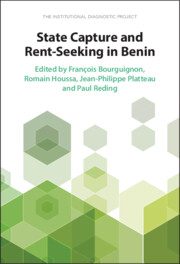State Capture and Rent-Seeking in Benin
Benin is a small, slow-growing economy whose development relies on two sources of rent that are controlled by self-centred elites: cotton export and illegal cross-border trade with Nigeria. Patrimonialism governs Beninese society as a forceful struggle for political power takes place between the oligarchs who control these sources and use them as formidable levers of power. State Capture and Rent-Seeking in Benin argues that this struggle causes the instability and unpredictability of economic policies, resulting in institutional problems that make economic diversification and growth difficult. Based on a thorough account of the economic, social, and political development of Benin, this institutional diagnostic provides a detailed analysis of its critical institution- and development-sensitive areas such as electoral campaign finance, state capture by business and elites, management of the cotton sector, the tax effort, the informal trading between Benin and Nigeria, and the political economy of land reform. This title is Open Access on Cambridge Core
François Bourguignon is Emeritus Professor of Economics, Paris School of Economics, and School for Advanced Studies in the Social Sciences, Paris. He is Former Chief Economist and Senior Vice President of the World Bank and a co-founder of the European Development Network. His awards include the Dan David Prize and Centre national de la recherche scientifique silver medal.
Romain Houssa is Professor of Economics, University of Namur, Belgium, and the principal investigator on the Benin Institutional Diagnostic Project. His main research deals with issues related to causes and welfare consequences of commodity markets and macro-economic fluctuations.
Jean-Philippe Platteau is Emeritus Professor of Economics, University of Namur, Belgium. At this university, he has been a long-time director of the Centre for Research in the Economics of Development, which he founded. He has held two Franqui chairs at the Free University of Brussels and the Katholieke University of Leuven. He is also a co-founder of the European Development Network.
Paul Reding is Emeritus Professor of Economics, University of Namur, Belgium. He has taught, carried out his research, and published in the field of monetary and financial economics, with a frequent focus on issues relating to developing countries.

